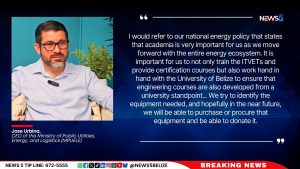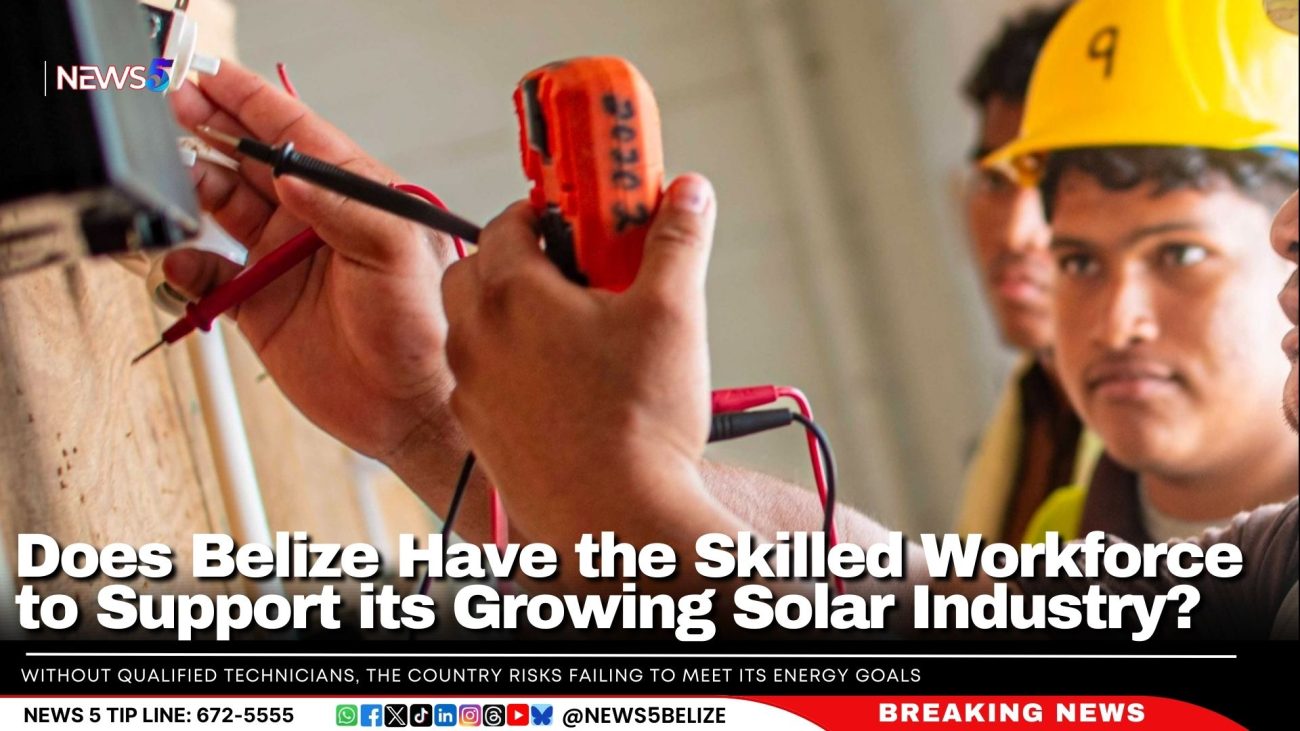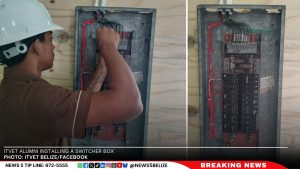Does Belize Have the Skilled Workforce to Support its Growing Solar Industry?
As Belize joins nations that are at the forefront of the global transition to clean energy, a pressing challenge is becoming clear: the shortage of skilled professionals to power the country’s renewable energy sector. “With the industry growing so quickly, we’re going to have a lot of boats on the water, but not many captains available to steer them,” said Silvan Kuffer, co-founder of Solar Energy Solutions Belize (SESB), a solar company in Belize.
The rise of solar energy in Belize comes at a time when the country is working to reduce its reliance on imported electricity and shift towards more sustainable energy solutions such as solar energy. According to the Belize National Energy Policy 2023, the cost of solar panels has dropped significantly, from US$1200 per kilowatt (kW) to US$200 per kW. This price reduction makes solar energy more accessible and it creates a convenient opportunity for Belize to take advantage of the abundant sunlight.
While the resources and opportunities for solar energy in Belize are growing, the question remains: Does the country have the skilled workforce to support this growth? Without qualified technicians, the country risks failing to meet its energy goals of becoming a low-carbon nation by 2040.
The Growing Need for Skilled Workers
With a population of just over 400,000 (2024 est.), Belize faces a challenge common to many small countries: a limited pool of professionals in many sectors. According to the Ministry of Education’s Statistics for 2022, only 732 students were enrolled in Vocational and Technical Education. This is important to note.
As companies like SESB point out, the most significant barrier to the country’s renewable energy growth is the shortage of technicians. The CEO of the Ministry of Public Utilities, Energy, and Logistics (MPUELE) Jose Urbina also recognised this shortage, stating, “There is a shortage of skilled technicians for solar energy, which is a huge challenge for us.” Urbina added, “Without technicians to install and maintain the systems, it becomes difficult to expand renewable energy capacity.”
The real question may not be whether Belize can use its solar potential, but whether it can do so without the skilled workers needed to make it possible. To tackle this, the government is working through its technical training institutions to close the skills gap and build the trained workforce needed for a sustainable energy sector.
The Solution to Belize’s Workforce Gap?
Since being established in 2010, the Institutes of Technical and Vocational Education and Training (ITVETs) have become a crucial solution for developing a skilled workforce to meet the needs of various technical and vocational sectors in Belize’s economy. These institutions provide practical, hands-on training in fields that are essential for the country’s development.
One such example is the collaboration between ITVETs and the Nova Scotia Community College (NSCC), which has helped to design a two-year renewable energy program at ITVET-Belize City. This program, launched under the Ministry of Education (MOE) with support from the Inter-American Development Bank (IDB), made it possible to equip “students to acquire practical, industry-standard skills to allow them to better contribute to Belize’s sustainable energy goals,” said MOE’s CEO, Dian Maheia. She stated that the program covers a range of topics, including solar energy, wind energy, and other sustainable technologies.
“The partnership with NSCC has been invaluable in ensuring that the curriculum at ITVET-Belize is up to date and aligned with industry standards,” Maheia said. Through this collaboration, instructors have been trained to teach renewable energy practices, which is what ITVET instructors have been “very vocal in demanding to better prepare themselves,” said Urbina.
Challenges in Solar Education and Training
Despite the integration of renewable energy programs, ITVETs still face several challenges. One of the challenges includes ensuring that students enter the programs with the necessary foundation in mathematics and physics, which are crucial for understanding solar energy systems. Reuel Black, the Manager of the ITVET in the Belize District, said that even with a high school diploma, “The biggest problem with students is their levels in mathematics and physics for renewable energy.”
To address this challenge, CEO Maheia stated that MOE has implemented the “integration of foundational scaffolding into the program structure.” She added that “several mandatory support subjects were included in the first semester of the first year of the program.” These courses are designed to help students strengthen their understanding of these essential subjects before diving into the technical aspects of solar energy. However, Maheia said that MOE “recognises that the institute may need to either offer preparatory and/or remedial classes.”
Additionally, Black said other difficulties include attracting enough students to make the courses sustainable. Since the launch of the program in 2023, only eight students have been certified. He said that without enough students for a second cohort, the program is currently on hold. Black explained that the cost of running the program and maintaining the necessary equipment can be a barrier for interested students. “We don’t have the amount of students to subscribe to run a course because we need to at least break even,” he said. “We have to pay the instructor; we have to buy materials and so on and maintain the labs.” Black also pointed out the challenge of keeping students focused: “Some students stay on their telephones, and you have to actually tell them to pay attention.”
In contrast, the Orange Walk ITVET will be certifying its first cohort of 60 students in the Electrical Installation program, which includes solar energy as part of the curriculum. The manager, Armando Gomez, said that these students have gained hands-on experience in solar panel installation and system maintenance along with a second trade offered simultaneously.
The instructor leading the solar energy courses at Orange Walk ITVET, Jose Solis, stated that many students who were initially apprehensive about solar energy have found it more accessible than they expected.
One of the key challenges at Orange Walk ITVET was obtaining the necessary equipment. Solar panels and related materials can be expensive, and “securing funding for these resources was not always easy,” Gomez said. However, Gomez attributed the institute’s success to strategic investments—much of which came from student fees—the institution now has a fully functional solar setup that powers part of their workshop.
Expanding Education in Renewable Energy
As Belize moves closer to its renewable energy goals for 2030 and 2040, ITVETs will play an increasingly important role in training a sustainable workforce in the energy sector. However, CEO Urbina added that it’s not only about training at ITVETs and providing certifications but also working closely with the University of Belize to develop engineering courses. This collaboration ensures that both technical and academic education support Belize’s energy transition.

Urbina explained this ambitious expansion will require additional resources, more instructors, and further investment in training equipment. As the country’s renewable energy goals scale in size, Urbina said that MPUELE aims to “try and identify the equipment needed, and hopefully in the near future, the Ministry will be able to purchase or procure that equipment and be able to donate it.”
By: Benita Kemé-Palacio, Digital Content Creator











Facebook Comments